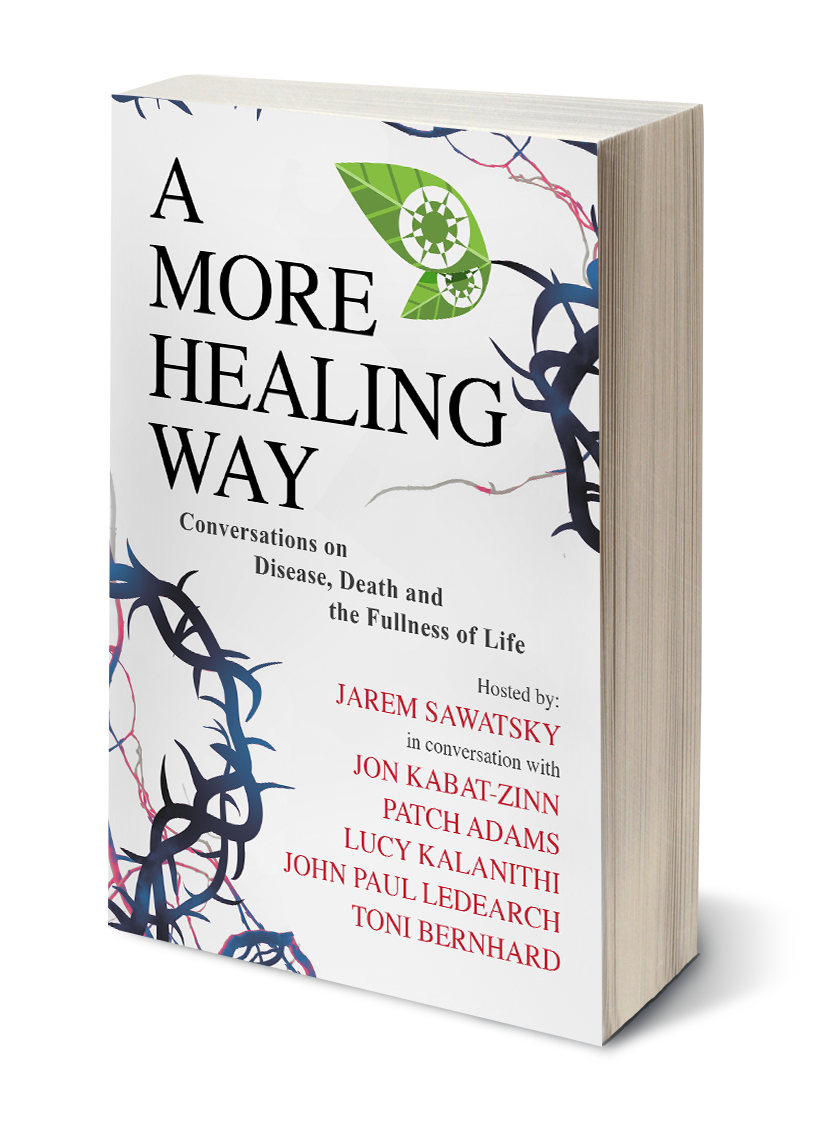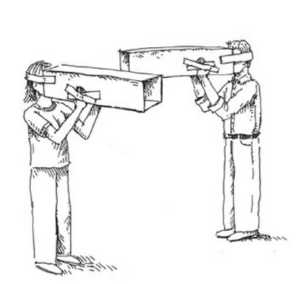
Where should I send the audio and video series?

Where should I send the audio and video series?
“We have heard nothing from you for 6 months. What has happened? Has your disease made it impossible for you to continue to write? How are you? Are you doing ok?” These are the questions I have received from some of you.
Don’t cry for me, my friends. I have been enjoying practicing embracing weaknesses – more specifically, how to rock tunnel vision. While the “successful” strive for an endless stream of multi-tasking, some engaging vision, and high impact action plans, I have been (re)exploring the one-thing-at-a-time method. Aging and my Huntington’s Disease have combined to strip me of any illusion that I might be able to multitask my way to anywhere.

In the “normal world” people expect to multitask. We are expected to get things done while at the same time respond to the waves of emails, facebook, phone calls, tweets, news, movies, friends, family…
But for me – I have been learning to lean into what I saw as my weakness and that which I feared. I do have a one-track mind. I am celebrating it. I have a deep, burning desire to focus all attention on one thing until it is finished. Rather than fight it, I experiment with living into it. I have got a lot of things done this way: paint cabin, create blog & website, refinish kitchen, redo hardwood floors. However, to do this I have had to ignore everything else. Don’t respond to friends and family. Don’t pay bills. Don’t clean the home. Don’t blog. Avoid social settings….
As part of my blog’s focus on A Beginners Guide to Losing Your Mind, I thought I would share four secrets to rocking tunnel vision (or whatever it is that you fear within yourself).
Doctors are sometimes fear-mongers. The way they try to name my experience in such a way that I become a bystander to my own health – paralyzed, traumatized and stupefied.
The Huntington‘s doctors don’t speak much about tunnel-vision, but they have their own way of naming the experience. They speak of obsessive thoughts, compulsive behaviors, recurrent intrusive thoughts. They say the holes in my brain (frontal lobes) are making some important tasks more difficult: organizing, prioritizing, controlling impulses, self-awareness, initiating and ending activities.
But I think this is a fear-based way of seeing my life. The focus is on the negative loss. Battling is this loss is a battle that can never be won. So rather, I try to tell my symptoms:
Making friends with enemies is about letting go of the horizon of fear so that a new, more healing horizon, might emerge.
Whatever you are afraid of in yourself, address it, name it yourself, welcome it, and replace fear with curiosity.
Fear leads us to fight, flight or freezing. But these are not good ways to build a friendship. Those strategies often kill friendships. Learning to laugh at and with that which we are afraid can be a very healing practice. I am learning that laughing is often a better strategy than fight, flight or freezing.

We are taught to see the downside of new problems or symptoms.
Laughing at the symptoms creates a playful space to welcome your new friends who will accompany you in this part of your life. As long as I was fighting or fleeing from tunnel-vision I did not have the capacity to laugh at it. Once I decided to make friends with tunnel-vision, laughing was a necessary practice. This is what I like doing with my other friends.
Tunnel-vision is one funny dude. Learn to see it and respond with laughter – not with the laughter of mocking or the laughter of giving up but with the laughter of recognizing the goodness in a friend.
Those of us who are losing our minds often innately try to hide, mask or manage the problem symptoms we are experiencing. But our symptoms can’t be hidden. To lose your mind in style, lean into weakness. Ask your new friend what they can teach you.
Inquire about what practices make this weakness flourish with goodness?
Tunnel-vision does not allow me to get multiple things done at the same time. If multitasking is my only definition of success, I will always fail this test. To unleash the benefit of tunnel vision I need a new measuring stick.
Tunnel vision allows us to touch deeply one speck of the universe. If each grain of the universe contains in some way the whole universe, then tunnel vision (seeing the speck) does not necessarily need to be at the expense of a more expansive vision. Tunnel vision then allows me to touch the whole universe by being truly present to the speck.
Part of the gift of the hereditary disease is that you can learn from how previous generations lived with it. My mom died from the same disease I have now. So I speak not just from the perspective of someone with a disease, but also from the perspective of one who tried to be a caregiver.
My mom loved tunnel-vision and this sometimes had devastating impacts on those of us around her. When my mom got focused on something in her tunnel-vision, she could tear apart anything that got in her way. For example, when my twin daughters were born, one of them was given my mother-in-law’s first name as her second name. My mom got it in her head that we needed to change the name of the other twin so that her second name would be my mom’s name. For about 8 months this was fixed in her tunnel vision. She would call me work and my home sometimes over 30 times a day. This is when we discovered the miracle of caller ID! To this day, I still cringe when the phone rings and I almost never answer it.
I share this story, to remind myself, that if I befriend disease symptoms, I need to learn to do it in such a way to protect my friends and family from the downside. In other ways, befriending symptoms is about dissolving fear, not about transferring the fear to those around me.
Embracing weakness requires us to make the deep transformation of our heart and mind:
If you want to lose your mind in style, begin this journey of embracing weaknesses. I have found that path full of laughter, love, and healing. I dare you to explore what your own journey of embracing weakness looks like.
I have read your book dancing with elephants and that’s book touch me deeply because it is amazing how you deal with Huntington disease. My mother had dementia for 20 years and I did my best to take care of her. It was very hard and sometimes I lost balance. I felt how these people are not respected and well-treated so often. I lost her last year because doctor didn’t check her did decide to change did treatment. She didn’t know my mother either as a person a patient. It was very painful. I am also a general practitioner and I felt guilty
Jarem, each time I read your blog it gives me goose bumps. Seems like you are in my HD mind and your blog comes out at the exact time I need it!
Having a difficult time making friends with my enemies.
Yes, great to hear from you again, Jarem (and Jarem’s friends : )
I find this posting leads me to reflect on love. There’s the delicate dance of loving who you are, including the tunnel vision or whatever weakness one has, and wanting to protect your loved ones from the downsides of your weakness.
I also think about how important it is to have a social safety net – so that hopefully every person has enough income to cover basic needs…. Although, some might respond that having a basic income for each person is like wishing away the hard things, that there are things to be learned from facing destitution…
I also have been wondering how you are doing. I confess to wondering even two days ago whether you must have died. Then instead, I learn you are insightfully alive. Wow. You are one courageous dude! Inspiring!
Thanks Terry.
Wonderful to hear from you Jarem. I’ve been thinking of you, looking forward to your next insights, and they are well worth the wait. Blessings on all your days …
Deep thanks. Jarem
Another brilliant insight Jarem.
I especially recognise your first point. It’s the inevitability of what’s to come. So it is not a battle. A battle implies some sort of possible “victory” for either side. It is not a fight to be fought. There is no enemy to fight with. To struggle against.
And I completely agree with your outlook. In my own personal “circumstance”, I don’t treat ataxia as an adversary. Instead, I treat it as part of me. And all parts of myself are personally cherished. Sure, I would prefer if it wasn’t a part of me. But it is.
And my able-bodied future is way too short to be spent in a struggle. Instead, I have embraced my new future. By walking (because this is an ability that will be lost first). And I have learned so much, about others and about myself, in the process.
If you like, you can follow my next wee (mis)adventure, as I continue my charity “walk” from Girona in the north of Spain, all the way down the Mediterranean coast of Spain to Gibraltar:
https://www.facebook.com/globalwalkforataxia/
“And my able-bodied future is way too short to be spent in a struggle.” So beautifully put. Thank you.
There is a 13 century Buddhist monk who said “Some say it is a miracle to walk on water. To me, it is a miracle to walk on the earth.” Walking is a sacred task. I wish you the best. Jarem
Thanks Jarem! Much appreciated.
Thanks for a wonderfully insightful article which, as someone training is dementia care, I think will resonate for many, including those living with other mental health issues.
So thought-provoking. Can’t wait for your next blog.
Mike
Mike thanks for your comment. It is my hope that this stuff has some “resonance for many.” Thanks for the encouragement.